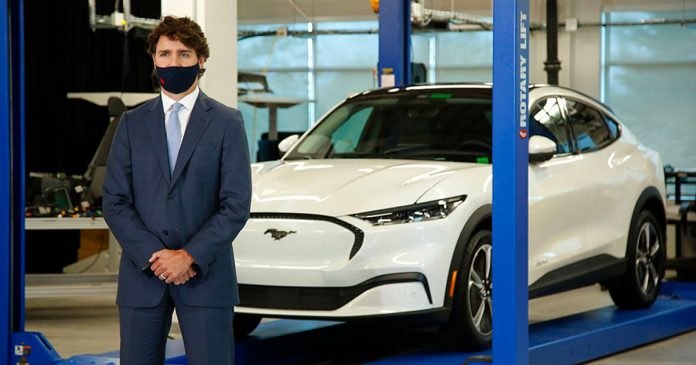A federal government report estimates the cost of the Trudeau government’s plan to install hundreds of thousands of electric vehicle (EV) charging stations to be approximately $20 billion.
As first reported by Blacklock’s Reporter, a department of natural resources report titled Canada’s Public Charging Infrastructure Needs: Updated Projections estimates that over the next few decades, Canada will have to invest billions of dollars into installing EV chargers across the country.
The report says, “In the very long term our overall estimate for public charging infrastructure needs across Canada would represent a total investment of approximately $20 billion over the next three decades.”
The report acknowledges that Canada’s cold might become a costly problem as EV batteries are notorious for underperforming once temperatures drop below freezing.
“As temperatures move towards the cold or hot extremes there are negative impacts on vehicle and battery efficiency resulting in greater charging needs,” said the report.
General Motors is being sued based on allegations that the Chevrolet Bolt was advertised as being able to drive up to 383 kilometres before needing to be charged but has a hard time reaching 300 kilometres during the winter.
The Trudeau government has been making a concerted effort to transition Canada from using combustion engine vehicles to electric vehicles by the year 2035 with big spending programs and annual targets.
Along with Ontario Premier Doug Ford, the Trudeau government committed hundreds of millions of dollars to construct an RV assembly plant in Oakville.
In 2022, the Trudeau government dedicated $1.7 billion in the federal budget to an EV subsidy program that would provide a $5,000 credit for purchasing a new electric vehicle.
The feds are also mandating that by 2026, 20% of vehicle purchases will be of EVs, increasing to 50% by 2030 and 100% by 2035. Currently, around 4% of vehicles sold in Canada are EVs.
To meet the 2035 target, the federal government report says that at least 442,000 public charging stations are needed on long distances of highway that do not serve high volumes of drivers.
According to Ernst & Young, Canada ranked second last among 14 countries evaluated in an annual EV readiness index. In addition, Ernst & Young found that Canadian demand for EVs trails the global average and that the initial cost of an EV inhibits consumers from picking them.
The average price of an EV costs $10,000 USD more than the auto industry’s average car.
